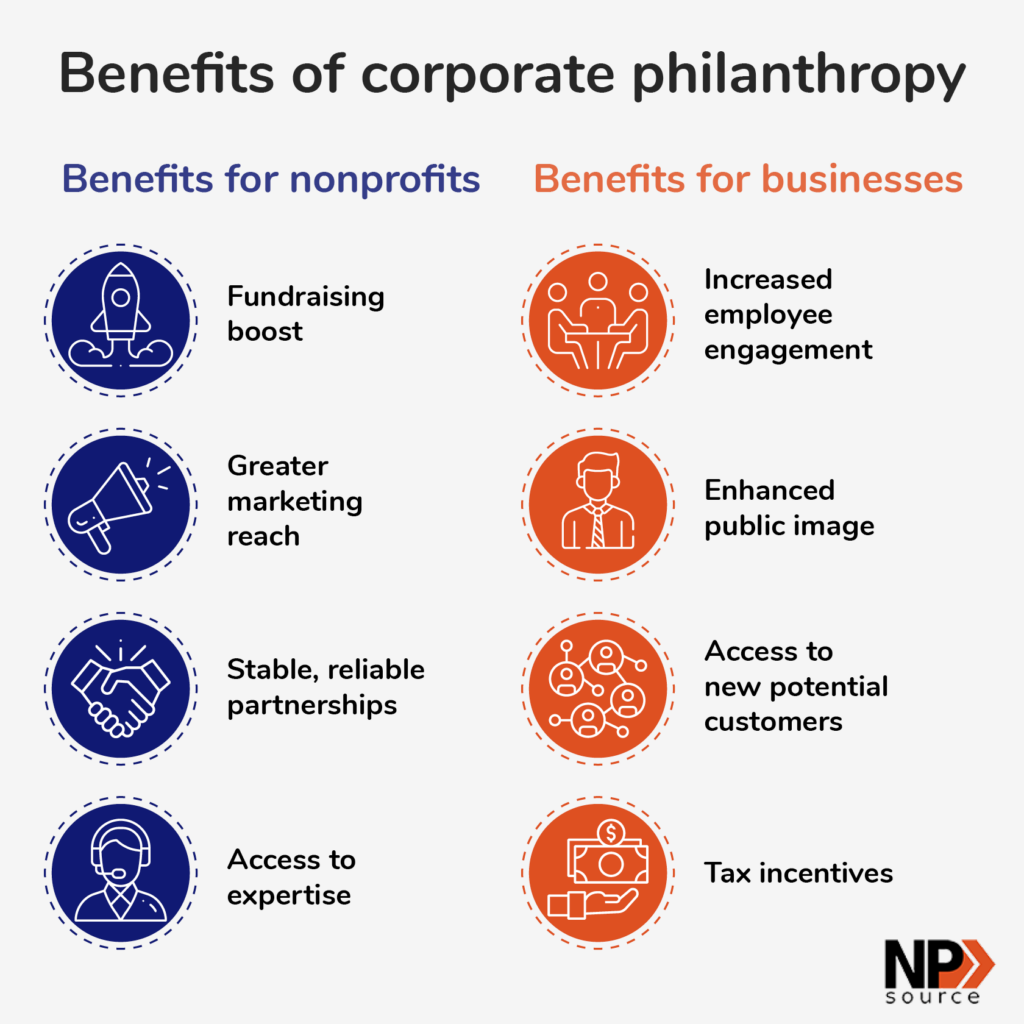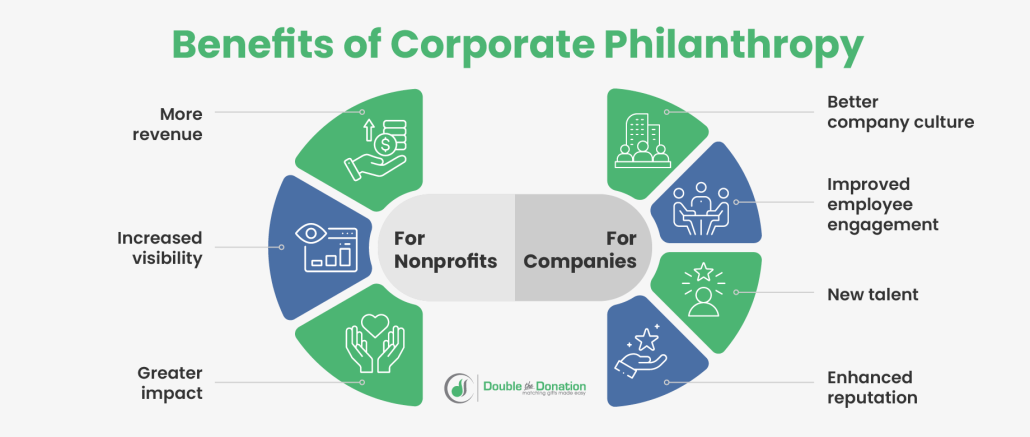Why corporate philanthropy is becoming central to competitive advantage
Checking Out How Corporate Philanthropy Shapes Brand Name Online Reputation and Client Loyalty
Corporate philanthropy considerably affects brand reputation and customer commitment. Business that participate in authentic charitable efforts usually see a favorable shift in how consumers view them. This positioning of worths cultivates depend on and psychological links with audiences. Nevertheless, the effectiveness of these kind efforts can vary greatly. Comprehending what really reverberates with consumers is necessary for brands looking for to improve their social impact and market setting. What strategies will arise as vital for future success?
The Evolution of Company Philanthropy
As companies significantly acknowledge their duty in society, the advancement of corporate philanthropy has actually transformed from simple charitable contributions to a strategic part of brand identity. Initially, business participated in philanthropy mainly for tax obligation benefits or to boost their public image. Over time, this strategy shifted as stakeholders-- including workers, capitalists, and consumers-- demanded a much more genuine dedication to social responsibility.
Organizations began aligning their humanitarian campaigns with their core worths and business objectives, causing even more impactful and thoughtful contributions. This change has encouraged companies to purchase lasting methods and area growth, cultivating a feeling of objective that reverberates with customers.
In addition, technological developments have assisted in transparency and interaction, enabling companies to showcase their humanitarian efforts much more efficiently. Corporate philanthropy has actually emerged as an important part of business approach, with organizations embracing the chance to positively affect culture while improving their total brand name narrative.
The Influence of Philanthropy on Brand Assumption
While business take part in kind efforts to advertise social great, these initiatives substantially shape brand name understanding among customers. Corporate philanthropy can boost a brand's photo by associating it with favorable social impact and area involvement. Customers commonly perceive brand names that proactively take part in philanthropic activities as even more trustworthy and responsible. This understanding can affect getting choices, as consumers might prefer brand names that show a commitment to social concerns.

Building Emotional Links Through Offering
Company philanthropy serves as a powerful tool for improving brand name identification by linking business worths with area needs. Through calculated offering, firms can foster community interaction and produce common worths that reverberate with customers on a psychological degree. This strategy not just reinforces brand name credibility however additionally constructs long-term links in between companies and their stakeholders.
Enhancing Brand Identity
They not only add to societal excellent yet additionally create deeper emotional connections with their target markets when firms involve in humanitarian efforts. By aligning their brand name with philanthropic reasons, companies boost their identification and signal worths that resonate with consumers. This alignment develops a story that goes past services and products, welcoming clients to join a shared goal. As customers progressively focus on purpose-driven brand names, business that actively participate in providing can differentiate themselves in a crowded market. Such campaigns promote a sense of commitment amongst customers that really feel personally attached to the brand's worths. Eventually, business philanthropy becomes an important tool for boosting brand identification, cultivating long-term partnerships based on common beliefs and psychological interaction.
Fostering Community Involvement
Various researches suggest that firms engaging in community-focused kind efforts can significantly strengthen emotional links with their stakeholders. By purchasing local tasks and supporting social reasons, companies grow a sense of belonging and depend on within the area. This interaction cultivates a positive brand name image, as clients value companies that show real issue for social problems. In addition, workers often feel extra honored and motivated to be connected with an organization that prioritizes community well-being. Therefore, customers are most likely to establish commitment in the direction of brand names that proactively add to meaningful causes. Eventually, cultivating area involvement through philanthropy not only enhances brand credibility however likewise constructs lasting emotional connections that profit both the area and the firm it offers.
Developing Shared Values
How can services properly create shared values that reverberate with their stakeholders? Companies can accomplish this by straightening their humanitarian initiatives with their core objective and the rate of interests of their neighborhoods. By participating in initiatives that address neighborhood demands, organizations cultivate psychological connections with consumers, boosting brand name loyalty. Partnering with non-profits that show shared values strengthens the brand name's picture and demonstrates dedication to social obligation. Furthermore, transparent interaction regarding these efforts permits stakeholders to see the concrete impact of their payments. Eventually, by integrating common values into their business philanthropy, companies not just enhance their track records however additionally grow long lasting partnerships with clients, resulting in boosted loyalty and trust fund. This positioning is vital in modern customer decision-making.
Situation Studies: Successful Philanthropic Campaigns
Analyzing effective philanthropic projects reveals different strategies that improve brand track record. Impactful community efforts, innovative partnership versions, and long-term involvement strategies have actually shown efficient in cultivating positive connections with customers. These case research studies highlight the value of thoughtful business providing in attaining both social and organization objectives.
Impactful Neighborhood Initiatives
Several companies have effectively leveraged kind campaigns to improve their brand name credibility while making a significant influence in their communities. For instance, a modern technology company launched a digital proficiency program in underserved neighborhoods, supplying training and sources that encouraged local residents. This campaign not just added to area advancement however likewise placed the business as a socially accountable leader. Likewise, a significant food business carried out an appetite alleviation project, partnering with neighborhood nonprofits to disperse dishes to family members in demand. This effort reinforced area connections and cultivated consumer commitment. With these impactful initiatives, companies have actually shown their commitment to social responsibility, efficiently aligning their brand worths with the demands of original site the neighborhoods they serve, ultimately boosting their general track record.
Innovative Partnership Models
The success of impactful community campaigns commonly rests on innovative collaboration versions that combine varied stakeholders to resolve facility social difficulties. Study show how firms, non-profits, and government entities can collaborate properly. A multinational company partnered with a local non-profit to introduce an education program, pooling resources and know-how to enhance neighborhood literacy prices. An additional example included a technology firm and a health care organization joining forces to create a telemedicine option for underserved populations. These partnerships not only magnified the reach of philanthropic efforts but also strengthened the brands' credibilities by aligning their missions with neighborhood needs. Eventually, innovative partnership models function as a catalyst for purposeful change and foster stronger connections between brands and their customers.
Lasting Interaction Techniques

Gauging the ROI of Company Social Responsibility
As companies progressively invest in corporate social obligation (CSR) initiatives, comprehending the return on investment (ROI) linked with these initiatives becomes vital. Determining ROI in CSR is complex, often including both qualitative and quantitative metrics. Economic returns can be analyzed via enhanced sales, improved brand name loyalty, and boosted worker spirits, which can lead to higher performance. Additionally, business might analyze cost savings linked to sustainable practices, such as minimized waste or energy usage.
Qualitatively, the influence of CSR on brand name track record can be examined through customer assumption research studies and social networks view analysis. Surveys can offer insights right into just how CSR activities influence consumer commitment and trust fund. Benchmarking versus market requirements can assist organizations assess their CSR effectiveness - corporate philanthropy. Ultimately, a thorough strategy to measuring ROI allows firms to make educated decisions concerning future CSR financial investments, lining up techniques with both financial performance and social effect
Customer Expectations and Corporate Duty
Increasingly, consumers expect companies to operate with a strong feeling of business obligation, watching ethical techniques as a requirement for brand commitment. This change in expectation shows a growing understanding of ecological and social issues, leading customers to prefer brand names that align with their values. Customers are much more inclined to support business that take part in clear techniques, show sustainability, and contribute positively to their neighborhoods.
Furthermore, social media sites amplifies these expectations, allowing consumers to share their point of views and experiences swiftly. Brands that fall short to fulfill these ethical requirements run the risk of backlash, while those that welcome business obligation usually take pleasure in superior track record and client commitment. As consumers require liability, business must integrate company social duty right into their core approaches, prioritizing honest habits not just as an advertising approach, but as a fundamental aspect of their procedures. This placement can ultimately bring about more powerful brand name affinity and sustained success in affordable markets.
Future Patterns in Business Philanthropy and Brand Loyalty
The landscape of corporate philanthropy is evolving, influenced by the heightened customer assumptions surrounding business responsibility. Firms are increasingly incorporating social influence right into their core company methods, not simply as a supplementary task. Future fads show a shift towards openness, with brands sharing in-depth information concerning their kind campaigns and their direct results on neighborhoods.
Furthermore, technology is playing an essential role, making it possible for real-time interaction in between customers and brand names. Social network platforms promote straight interaction, allowing customers to voice their expectations and hold brand names answerable. In addition, younger generations, particularly Millennials and Gen Z, prioritize sustainability and honest practices, driving services to take on more diligent techniques.
As corporate philanthropy becomes identified with brand identity, business that authentically align their objectives with societal demands are most likely to promote stronger consumer loyalty. This merging of values will eventually shape the future of company track record and customer relationships in a progressively diligent industry.
Often Asked Concerns
Just How Do Customers Discover a Company's Philanthropic Initiatives?
Consumers find a firm's kind initiatives via numerous channels, consisting of social media sites, press launches, neighborhood occasions, and word-of-mouth. These avenues help with recognition, allowing individuals to involve with brand names that straighten with their values and interests.
What Function Does Worker Participation Play in Business Philanthropy?
Worker involvement in company philanthropy boosts engagement, fosters a sense of possession, and reinforces team communication - corporate philanthropy. This participation usually magnifies the impact of philanthropic initiatives, leading to greater awareness and assistance for the firm's philanthropic efforts
Can Corporate Philanthropy Backfire on a Brand's Reputation?
If perceived as opportunistic or insincere, company philanthropy can indeed backfire on a brand's credibility. Negative public understanding may develop, resulting in decreased trust and commitment amongst customers that prioritize authenticity in corporate activities.
Are Smaller Sized Business as Effective in Philanthropy as Larger Companies?
Smaller business can be just as efficient in philanthropy as larger corporations, commonly showing agility and credibility. Their local initiatives might reverberate a lot more deeply with areas, promoting authentic connections in spite of minimal sources contrasted to their bigger counterparts.
How Can Business Pick the Right Creates to Support?
Companies can pick the ideal reasons by More about the author straightening their worths with community needs, evaluating stakeholder rate of interests, and examining possible impact. This calculated strategy fosters authenticity, improves interaction, and reinforces connections with clients and the wider community.
While companies involve in humanitarian efforts to advertise social great, these efforts considerably form brand name perception among consumers. As customers increasingly prioritize purpose-driven brands, firms that actively involve in providing can separate themselves in a congested market. Numerous companies have efficiently leveraged philanthropic campaigns to improve their brand track record while making a significant influence in their areas. Increasingly, consumers anticipate firms to operate with a strong sense of business responsibility, viewing honest methods as a prerequisite for brand commitment. As company philanthropy comes to be synonymous with brand name identification, business that authentically straighten their missions with societal requirements are likely to cultivate more powerful customer commitment.